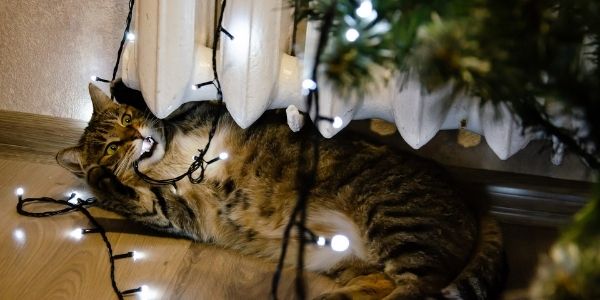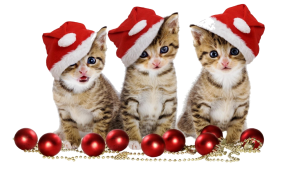
Christmas is a magical time, but it can be stressful your beloved feline friend.
From the temptations on the Christmas tree, to the stress of new visitors, Christmas can pose hazards for your curious cat.
Here are some tips to help you keep your Cat safe over the Christmas period.
Cats and Christmas trees
Whether real or artificial, Christmas trees pose a hazard for your cat. They’re naturally curious about anything bright and sparkly, so your cat will probably want to climb the tree in the corner of the living room! Here’s our tips for keeping your feline friend out of trouble.
Can you have a real Christmas tree with cats?
There are some things to consider if you have a cat and are thinking about getting a real Christmas tree:
The oils produced by some real Christmas trees are mildly toxic and can irritate your cat’s mouth and stomach.
Be careful when using fertilisers or plant food on your potted tree – many are toxic to cats and can leak into watering trays.
Pots with soil might get used as litter trays.
There’s a small risk that sharp pine needles can cause damage to your cat’s tummy if swallowed.
If you want a real Christmas tree, you could consider buying one of the non-drop variety.
Please do not buy a Christmas tree with fake snow that is sprayed onto it, this is highly toxic to Cats and if they ingest the snow by chewing or licking it can kill them.

How to ‘cat-proof’ your Christmas tree
Avoid tinsel
Tinsel and other hanging tree decorations can look just like cat toys. Your cat could swallow them, or even break glass ornaments, causing injury.
Tinsel in particular can cause serious illness. If it’s eaten, it can cause a blockage in the stomach and intestines, and in some cases this can be fatal.
Secure decorations
Secure your Christmas decorations to the tree as tightly as possible, so they’re not easily knocked off with a cheeky tap of the paw!
Get a heavy base
Invest in a good quality, heavy base to prevent your Christmas tree from toppling over, or place weights to secure it at the bottom, just in case your cat decides to climb the tree!
Keep decorations up high
Hang decorations higher up the tree, out of the reach of playful paws – this may help to stop your cat from climbing the Christmas tree.
Don’t place any tempting presents under the tree. If you have a particularly playful and curious cat, make sure you offer them plenty of opportunities for fun, games and playtime away from the tree and decorations.
Snow globes shouldn’t be kept anywhere where they can be knocked over and smashed, as they can contain a chemical called ethylene glycol, otherwise known as antifreeze, which is highly poisonous to cats.
Lights
Christmas lights can be a real danger to cats if they decide to chew on electrical wiring.
Always switch lights off at the mains when you’re not around to supervise your cat
Consider using battery powered LED lights instead
Illustration of a plug socket with a cable running through a cardboard tube
Tidy cables
If you do use electric lights, cover any exposed wires with plastic or cardboard tubes.
If your cat is playful and mischievous, it’s a good idea to shut them out of the room the Christmas tree is in when you’re not around to keep an eye on them.

What plants are poisonous to cats?
Christmas lillies
Festive red lilies can be fatal to cats.
Christmas flowers and plants may make our homes look festive, but many are poisonous to our feline friends.
These plants are best kept away from curious paws:
- Poinsettia – poinsettia poisoning is mild
- Lilies – all parts of the plant are poisonous
- Holly and Mistletoe – the berries are the most toxic
- Amaryllis plants – the bulbs, stalks and flowers are all toxic
- Contact your vet straight away if your cat has eaten any poisonous plants.
Christmas foods poisonous to cats
Christmas is the time to cook up a storm, but remember that your cat will be ready to lick up the mess if you spill something! Take care with hot foods as it can cause burns.
A number of Christmas foods are also toxic to our feline friends. Christmas foods toxic to cats include:
- Onions and Garlic (cooked or raw) – remember that onion gravy is toxic to cats, so keep it out of paws reach
- raisins
- grapes
- chocolate
- alcohol – alcohol can be dangerous in small quantities, so wipe up spillages quickly
- The string from meat should always be kept out of paws reach. Any string can cause a stomach blockage, but when it’s covered in tasty meat, it’s even more tempting!
What should I do if my cat has been poisoned?
If you think your cat has eaten something dangerous, contact your vet immediately.
All vet practices must have an emergency service available over Christmas – but remember, you may need to drive there.
You should also:
Have any packaging to hand so that you can tell the vet exactly what your cat has eaten.
Take samples along if you have seen your cat chewing something.
Clear obstacles out of the way and make the room dark and quiet if your cat is staggering or having a fit.
If you’re not sure whether your cat has been poisoned, take a look at the common signs and symptoms and speak to your vet for advice on whether they need to be seen.
Stress in cats at Christmas
With so many visitors, change and new smells, Christmas can be a stressful time of year for cats, particularly nervous ones.
Try to avoid:
Excessive cleaning and moving furniture about.
This can disturb your cat’s important marks of scent around the home, making them more nervous
Inviting other animals into your home.
If other animals are in your home, keep them or your cat in a separate room – just remember to provide them with everything they need such as their food, water and litter tray.


